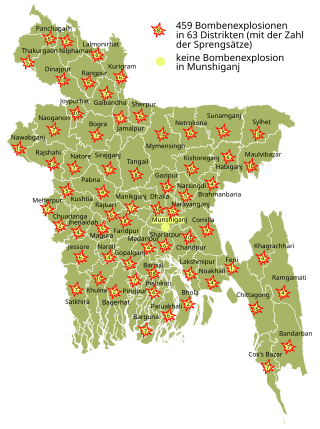
Terrorism, in its broadest sense, is the use of violence against non-combatants to achieve political or ideological aims. The term is used in this regard primarily to refer to intentional violence during peacetime or in the context of war against non-combatants. There are various different definitions of terrorism, with no universal agreement about it. Different definitions of terrorism emphasize its randomness, its aim to instill fear, and its broader impact beyond its immediate victims.
Religious terrorism is a type of religious violence where terrorism is used as a strategy to achieve certain religious goals or which are influenced by religious beliefs and/or identity.
Islamic terrorism refers to terrorist acts carried out by fundamentalist militant Islamists and Islamic extremists.
A lone wolf attack, or lone actor attack, is a particular kind of mass murder, committed in a public setting by an individual who plans and commits the act on their own. In the United States, such attacks are usually committed with firearms. In other countries, knives are sometimes used to commit mass stabbings. Although definitions vary, most databases require a minimum of four victims for the event to be considered a mass murder.

Professor Bill Durodié is a Professor of Politics, Languages and International Studies at the University of Bath, UK, as well as a former head of department there.
ProfessorRohan Gunaratna is a threat specialist of the global security environment. Professor Gunaratna has over 30 years of academic, policy, and operational experience in national and international security. He is Professor of Security Studies at the S. Rajaratnam School of International Studies, Nanyang Technology University, Singapore.

The Institute for Defense Analyses (IDA) is an American non-profit corporation that administers three federally funded research and development centers (FFRDCs) – the Systems and Analyses Center (SAC), the Science and Technology Policy Institute (STPI), and the Center for Communications and Computing (C&C) – to assist the United States government in addressing national security issues, particularly those requiring scientific and technical expertise. It is headquartered in Alexandria, Virginia.

Sociology of terrorism is a field of sociology that seeks to understand terrorism as a social phenomenon. The field defines terrorism, studies why it occurs and evaluates its impacts on society. The sociology of terrorism draws from the fields of political science, history, economics and psychology. The sociology of terrorism differs from critical terrorism studies, emphasizing the social conditions that enable terrorism. It also studies how individuals as well as states respond to such events.
The revolving door policy is the name for an alleged policy of the Palestinian Authority (PA). Under this policy, the PA would arrest terror suspects in order to appease the international community and Israel, but then either release them, facilitate their escape, or move them to very comfortable conditions. The term was used by the Israeli, British, and United States governments.

Jamaat-ul-Mujahideen is a radical islamist terrorist organisation operating in Bangladesh. It is listed as a terror group by Bangladesh, India, Malaysia, The United Kingdom and Australia. It was founded in April 1998 in Palampur in Dhaka Division by Abdur Rahman and gained public prominence in 2001 when bombs and documents detailing the activities of the organisation were discovered in Parbatipur in Dinajpur district. The organisation was officially declared a terrorist organisation and banned by the government of Bangladesh in February 2005 after attacks on NGOs. But it struck back in mid-August when it detonated 500 small bombs at 300 locations throughout Bangladesh. The group re-organised and has committed several public murders in 2016 in northern Bangladesh as part of a wave of attacks on secularists.

The Mujahideen Army was a Sunni militant group in Iraq. The group first emerged in late 2004. The Mujahideen Army is one of the founding members of the Jihad and Reform Front as well as a member of the Political Council for the Iraqi Resistance (PCIR). The Mujahideen Army is comprised almost exclusively of native Iraqi Sunni Muslims, including ex-members of Saddam Hussein's military and security agencies such as Fedayeen Saddam, Special Republican Guard, Republican Guard and the Special Security Organization.
Indian Mujahideen (IM) is an Islamist terrorist group which has been particularly active in India. The jihadist group was founded as an offshoot of the Students' Islamic Movement of India (SIMI) by several radicalized members including Iqbal Bhatkal, Riyaz Bhatkal, Yasin Bhatkal, Abdul Subhan Qureshi, Amir Reza Khan and Sadiq Israr Sheikh, among others. It has been active since at least 2005 when it bombed the Dashashwamedh Ghat in Varanasi. It carried out several serial-bombings in Indian cities in the following years notably the 2007 Uttar Pradesh bombings, 2008 Jaipur bombings, 2008 Ahmedabad bombings, 2008 Delhi bombings, 2010 Pune bombing, 2011 Mumbai bombings, 2011 Delhi bombing, 2013 Patna bombings, 2013 Hyderabad blasts and the 2013 Bodh Gaya bombings.
Critical terrorism studies (CTS) applies a critical theory approach rooted in counter-hegemonic and politically progressive critical theory to the study of terrorism. With links to the Frankfurt School of critical theory and the Aberystwyth School of critical security studies, CTS seeks to understand terrorism as a social construction, or a label, that is applied to certain violent acts through a range of political, legal and academic processes. It also seeks to understand and critique dominant forms of counter-terrorism.
The Laboratory for Computational Cultural Dynamics (LCCD) is a multidisciplinary research laboratory located under the University of Maryland’s Institute for Advanced Computer Studies (UMIACS). The lab primarily focuses on the development of theory and algorithms that describe decision making in cultural contexts. An important secondary goal is the development of tools to support such decision making, based on the aforementioned theoretical work. The lab is co-directed by Prof. V. S. Subrahmanian and Prof. Dana Nau.

Jessica Eve Stern is an American scholar and academic on terrorism. Stern serves as a research professor at the Pardee School of Global Studies at Boston University. Earlier she had been a lecturer at Harvard University. She serves on the Hoover Institution Task Force on National Security and Law. In 2001, she was featured in Time magazine's series on Innovators. In 2009, she was awarded a Guggenheim Fellowship for her work on trauma and violence. Her book ISIS: The State of Terror (2015), was co-authored with J.M. Berger.
Maxwell "Max" Taylor is a criminal and legal psychologist. His early work specialised in the study of terrorism but he also became involved in the study of sex offenders, and in the development of capacity building activities for disadvantaged children in conflict zones, returning later to the study of terrorism.
The Chicago Project on Security and Threats (CPOST) describes itself as an "international security affairs research institute based at the University of Chicago." Formerly known as the Chicago Project on Security and Terrorism, and the Chicago Project on Suicide Terrorism, it was founded in 2004 by Robert Pape, professor of political science at the University of Chicago and author of Dying to Win, a book about suicide terrorism. It compiles, maintains and publishes the Database on Suicide Attacks, a comprehensive dataset of suicide terrorism around the world that covers attacks from 1974 to 2019. CPOST frequently works closely with the United States government, particularly the Department of Defense.
Raghava Krishnaswami Raghavan is a former Indian police chief and diplomat. He was the director of the Central Bureau of Investigation from 4 January 1999 to 30 April 2001. He investigated high profile cases such as the Priyadarshini Mattoo murder case, the 2000 South Africa cricket match fixing, and the 2002 Gujarat riots.
Milton Leitenberg is an American academic specializing in arms control and weapons of mass destruction. He is a senior research associate with the Center for International and Security Studies at Maryland (CISSM), a division within the School of Public Policy at the University of Maryland.







